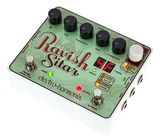When I came across this pedal on Electro Harmonix webpage, I jumped off from my seat in utter excitement, I couldn't work the whole day I was rest less to see this pedal. I am a big fan of famous sitar player Ravi Shankar and his daughter Anoushka Shankar, I always loved the sound of sitar and also because I am from India, everyone cracks lame stereotype jokes "Oi you are from India you should be playing a sitar instead of a guitar" , hehehe. Well guess what now I have an answer to them :D.
Anyways, Thomann had the lowest price for this pedal (~160 Euro), so I ordered it, it was delivered in a week, I opened the box, and on the 1st leaflet of the box it says "Jai Guru Deva", I laughed so much in happiness. "jai Guru Deva " means "Praise the Guru who is also god" in Sanskrit. I took of early from work, so that I can spend the whole evening having fun with this pedal, plugged it in, and Zinggggg the sound of sitar, and there was a genuine smile on my face.
To make best use of this pedal you have get a slight understanding of how a sitar works,
This pedal is highly tweakable you can get quiet a range of sounds from it, you can program and save the patches, it allows you to store 10 presets and one dynamic mode. You can use footswitch to toggle betwwen the patches, it has two outputs, one is the main out put and another is the sympathic strings output, google for "tanpura" , you will understand.
If you hold down the preset foot switch, it will generate a awesome drone sound of the tanpura, this is something similar to the "infinite reverb" feature on EHX-Cathedral pedal, I just love it, now feed that drone sound and the main Sitar sound into a stereo delay and then into a stereo Reverb, and use two amplifiers one for each channel, and right there my friend you will see the gates of "Moksha" your brain will slip into a vortex , you will feel enlightenment. :D
This pedal goes very good with delay's and reverbs, I have used it with TC-Flashback delay, and BYOC-Reverb. Also you can use distortion pedals infront of it, it case you want it to sound more louder.
I have used this pedal even in Amplifier FX-Loop, works like charm. It can handle both line and instrument level Amplifier FX loops. Actually I like it more in the FX loop than in front of Amp, and I've come across some folks who like this pedal straight into a DI-box instead of an Amp, you should try it out to see what works for you.
Overall I love this pedal. But yes of course it doesn't sounds like a real sitar, but still I love it's sound.


